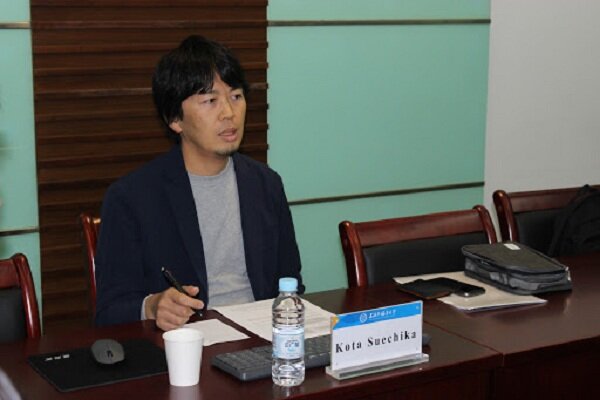Japanese professor calls Iran-China partnership epoch-making
“The world is drifting from unipolar to multipolar”

TEHRAN – A Japanese professor is of the view that the Iran-China partnership is “epoch-making” that shows the emergence of a non-U.S. economic axis in the world.
“It is literally epoch-making in the sense that it is a sign of the emergence of a non-U.S. economic bloc in the world,” Kota Suechika tells the Tehran Times.
The professor of Middle Eastern and Islamic Studies at Ritsumeikan University believes that “China’s diplomatic initiative, backed by its rapid economic development, would bring about structural change to the world defined by the U.S. supremacy in the last 30 years.”
On March 27, China signed a landmark 25-year comprehensive strategic partnership with Iran. The ground for such a partnership was laid during President Xi Jinping’s visit to Iran in 2016. According to some reports, China plans to invest $400 billion in Iran for 25 years.
The China-Iran partnership has been widely claimed as a game-changer in the region, and a cornerstone for China’s footprint in West Asia.
Pointing to the partnership, the Japanese academic emphasizes that “the world is drifting from unipolar to multipolar.”
Following is the text of the interview:
Q: How do you assess President Biden's foreign policy when it comes to Iran in particular and West Asia in general? Do you see any real departure from the previous administration’s policy?
A: The Biden administration is expected, inside and outside the U.S., to be “different” from the former - Trump administration - in political stances and policies, particularly diplomacy. Therefore, President Biden needs to meet such expectations by implementing more moderate and even cooperative diplomacy with the non-U.S. allies such as Iran and China.
“While Japan and South Korea acknowledge China’s economic and political significance in East Asia, they remain under strong U.S. influence.”But President Biden’s first two months in his office have not shown it much despite his declaration “America is back”. This is perhaps due to his careful political stance in nature. As most Americans still believe the so-called “Iranian threat” to the U.S. national security, and also the Israel lobby continues to claim it, he cannot rush to make a dramatic revision of the U.S. diplomacy. At least, there is little incentive for him to quickly do it. However, I think, sooner or later, he is to move forward.
Q: Why did Europe and countries like South Korea and Japan fail to confront U.S. unilateral sanctions on Iran when the Trump administration violated its obligations under the nuclear deal? How can Iran rely on a partnership with these countries again?
A: Japan has no reason to be an opponent of Iran. The history of the relations between the two countries told us it. But Japan and also South Korea are historically the U.S. allies in East Asia and economically and politically rely on Washington so that they have difficulties to establish their fully independent foreign policy, particularly their relations with countries that are regarded as threats by the U.S. In this sense, you can see that East Asian countries are far from coordinated because Japan and South Korea, and also Taiwan are taking a role in the containment of China’s hegemonic foreign policy.
However, this implies, in turn, that the Iran-U.S. rapprochement is expected to foster Iran’s relations with Japan and South Korea. It depends on the new U.S. administration’s attitude, especially about coming back to the JCPOA.
Q: How do you assess the 25-year Iran-China partnership?
A: It is literally epoch-making in the sense that it is a sign of the emergence of a non-U.S. economic block in the world. In other words, the world is drifting from unipolar to multipolar.
Q: Will China surpass the U.S. economically in the coming decades?
A: China’s diplomatic initiative, backed by its rapid economic development, would bring about structural change to the world defined by U.S. supremacy in the last 30 years. This does not guarantee a more stable and peaceful world but seems irreversible anyway.
Q: Do’s you expect Asian states from East Asia (Japan and South Korea) to West Asia (Iran and Turkey) to build an economic bloc in cooperation with China?
A: I do not think so. At least, it does not yet happen. As told above, while Japan and South Korea acknowledge China’s economic and political significance in East Asia, they remain under strong U.S. influence. It is a common dilemma of the two countries between the U.S. and China.
Q: How do people and media in Japan and East Asia in general look at developments in West Asia?
A: It’s been about 20 years since I started to research and teaching about Middle East (West Asian) politics at Japanese universities. My impression is that Japan’s concern for the region has been declining, especially among young people. This is perhaps because they are tired of hearing about the region. When the Middle East (West Asia) comes up in the news headlines, they are always about conflicts and terrorism. As a university professor, I will continue to conduct my research on the Middle East (West Asian) politics, but also introduce the positive aspects such as the people and culture of the region to my students. These young generations hopefully can build a better bridge between Iran and Japan in the near future.
Leave a Comment